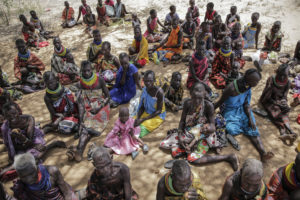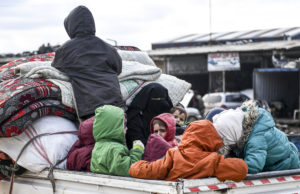Child Mortality Rate 70 Percent Higher in U.S. Than in Other Rich Nations
The most common causes of death among children renew concerns about the American health care system, access to guns and vehicle safety. Young people participate in a protest opposing presidential candidate Donald Trump in Minneapolis in August 2016. (Fibonacci Blue / CC 2.0)
Young people participate in a protest opposing presidential candidate Donald Trump in Minneapolis in August 2016. (Fibonacci Blue / CC 2.0)
American kids are 70 percent more likely to die during childhood compared with children in other wealthy, democratic nations, according to a peer-reviewed study published Monday by Health Affairs.
“This study should alarm everyone,” Dr. Ashish Thakrar, the study’s lead author and an internal medicine resident at Johns Hopkins Hospital and Health System, told CNN.
“The U.S. is the most dangerous of wealthy, democratic countries in the world for children,” he added. “Across all ages and in both sexes, children have been dying more often in the U.S. than in similar countries since the 1980s.”
The most common causes of death among children renews concerns about the American healthcare system, access to guns, and vehicle safety.
The risk of death is even higher for American infants and teenagers compared with their counterparts abroad. Babies in the U.S. are 76 percent more likely to die during their first year of life—often because of sudden infant death syndrome (SIDS) or complications related to being born prematurely—while 15- to 19-year-olds are 82 times more likely to die from gun violence, which Thakrar called “the most disturbing new finding.”
Thakrar and his fellow researchers examined the childhood mortality rates from 1961 to 2010 for the United States as well as 19 other nations in the Organization for Economic Cooperation and Development (OECD), including Australia, Canada, Japan, and several European and Scandinavian countries.

The frequency of childhood deaths in all of these countries, including the United States, notably declined during those 50 years. However, the U.S.’s high childhood mortality rate compared with the other nations studied, as Thakrar pointed out, “means 600,000 more children died since 1961 than would have if we performed at just the average of the other 19 countries.”
Thakrar told Vox‘s Sarah Kliff he believes the study’s findings are tied to a rise in childhood poverty in the U.S. during the 1980s, but also is in large part “the impact of our fragmented healthcare system” in the United States. For example, he said, “Mothers who are qualifying for Medicaid for the first time because they’re mothers might be seeing doctors for the first time. They might not have a family physician, or a clear support system.”
As numerous analyses and studies have shown over the years, the lack of a universal healthcare system in the U.S. has led to higher mortality rates and poorer healthcare outcomes than in countries that have robust systems that cover all people.
While the Republicans’ tax plan, which passed Congress and was signed by President Donald Trump late last year, partly dismantles the American healthcare system, lawmakers continue to put off refunding the national Children’s Health Insurance Program (CHIP)—which serves 9 million children—and Maternal, Infant, and Early Childhood Home Visiting (MIECHV) program, which expired at the end September.
Although federal lawmakers passed a short-term spending measure that provided some funds for CHIP just before the New Year, states are continuing to warn recipients that without further funding, they will soon run out of money and no longer be able to provide necessary healthcare services.
“Multiple states have sent out letters warning families that their kids’ health insurance could end on January 31,” Kliff detailed in another article. “Congress did pass a temporary bill that it expected to extend CHIP’s life span until March—but it turns out they got the math wrong, and states may run out of funding as early as January 19. Eleven days from now.”
Thakrar told Kliff he is concerned about how funding instability for programs that provide healthcare to American kids will continue to impact childhood mortality rates in the United States.
“We’re seeing the effects of instability right now,” he said. “All across the country families are waiting to hear if CHIP will be reinstated, whether they’ll continue to have health insurance, their household visitations are at risk. Programs that have proven their benefit in the country still face constant instability.”
Your support matters…Independent journalism is under threat and overshadowed by heavily funded mainstream media.
You can help level the playing field. Become a member.
Your tax-deductible contribution keeps us digging beneath the headlines to give you thought-provoking, investigative reporting and analysis that unearths what's really happening- without compromise.
Give today to support our courageous, independent journalists.









You need to be a supporter to comment.
There are currently no responses to this article.
Be the first to respond.